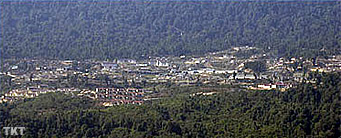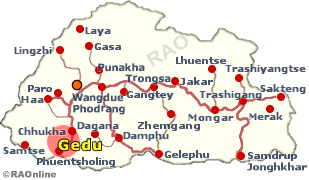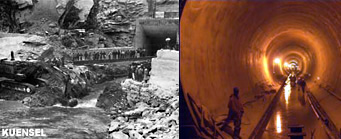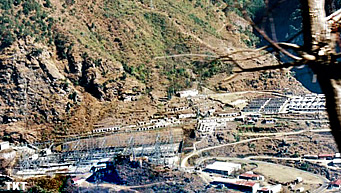 |
Bhutan's
Economy: Hydroelectric Power |
|
|
 |
| Gedu
booms but will it last ? - Tala, Hydroelectric Project |
 |
 |
| Gedu grows from a village to a bustling town overnight |
| A
tiny town (or call it a village) of Gedu, four years back, was almost in
slumber.
It
was like a small railway station waiting for a train that would never come
- a quiet, small settlement with foggy weather almost all the year round. |
|
Then,
one fine day, the train came and Gedu turned into a brand new town overnight.
Thanks to the 1,020 MW Tala Hydroelectric Project Authority (THPA), Gedu
today is one of Bhutan's fastest growing towns.
 |
| When
the project started in 1998, droves of people flocked to Gedu looking for
jobs and businesses. Thousands of workers including labourers made Gedu
their temporary home. The number of shops more than trebled. Sinchekha
and Arekha (the power house colony) together have about 38 shops from none
four years ago.
As
Gedu expanded with the increase in infrastructure, developmental activities
encroached the surrounding forest, the fog appeared less and less. |
|
The
executive engineer of the infrastructure, Mr V P Arora, said that what
he saw in 1997 and 1998 and what he sees today are vastly different.
"Before
there was no telephones or STD facilities, we had to go to Phuentsholing to call our families," he said. "Before Gedu used to be foggy almost all
the time and now fogs hardly appear. The climate has become much warmer."
Today,
the town is bustling with life - the project generated both business opportunities
and employment. About 90 percent of the buildings that have come up in
the last four years were built by the project authorities, some for offices
and some as homes for its staff. For residence alone, the THPA has constructed
843 units of apartments. About Nu 897.117 million was spent on the buildings
(including the high school at Gedu) constructed in and around Gedu on a
total plinth area of 132,505 metre square.
 |
| Tala Hydroelectric Project |
| Gedu
now has a 20-bedded hospital with five doctors benefiting other surrounding
villages as well. From salaries to medical equipment to medicines, all
are supported by the THPA. A high school, having a capacity of 1,300 students,
was also built. |
|
The cost of the construction of the buildings and the sports
infrastructure amounted to about Nu 50 million.
"We
have carried out the constructions keeping in mind the traditional architecture
and as well as the environment," said Mr Arora. "Some areas of forest had
to be cleared for constructions but we have planted many trees, as many
as we have cleared."
A
total of 122 kilometres of roads was constructed at a cost of about Nu
1222 million, and 15 bridges at Nu 104.5 million. Mr Arora said that the
THPA will also widen and improve the highway from Gedu to Phuentsholing
at certain places.
Gedu
is also supplied with free treated and filtered water from the water treatment
plant built at the cost of Nu 30 million. The plant, with a storage capacity
of 707,600 litres, can supply to a population of about 5,500.
The
construction of a sewerage treatment plant, begun with a cost estimate
of about Nu six million, is scheduled for completion by the end of this
year.
"In
1998 when I came here Gedu was a small and sleepy place and the shops used
to open only at about 9:30 am. Today it opens at 6:30 am," said Mr Vatsal
Chopra, the superintending engineer of powerhouse. "Now we also have medical
shops."
 |
| Chukha Hydroelectric Project |
| Two
years ago, 70-year old Pelchung of Chapcha set up a grocery shop gauging
the market the project would create. He shifted his shop from Thimphu citing
that the rent in the capital was too high.
Dawa
Lhamu telephone booth, started in August last year, today earns about Nu
2,000 a day. |
|
About 30 to 40 calls are made daily. Gedu today has four booths
from none before.
In
the beginning of 1999, Gedu had only about three telephone subscribers.
In
2002 it had about 250 while Padechu has 20, Sinchekha 50, and the Tala
village about 60.
One
resident said that he knew of a businessperson who had nothing three years
ago but now had a fleet of trucks.
"He
got lot of businesses from the THPA," he added.
According
to the Royal Bhutan Police at the Rinchending checkpoint, about 500 vehicles
(including trucks and light vehicles) associated with the THPA cross the
checkpoint daily.
However,
some believe that Gedu could face a future similar to Tshimalakha, which
has today become a "ghost town". The Chukha Hydroelectric Project created
Tshimalakha but when the project was completed, the small town was left
high and dry.
Mr
Arora said that when any project starts there will be business and where
there is business entrepreneurs will be attracted. "The government has
to come out with ideas to use the created infrastructure judiciously,"
he added.
Pema
Dorji of Dzorig Gongphel Construction said that Gedu's fate would be different.
It was a transit town, located on the busiest highway unlike Tshimalakha,
which is situated off the highway.
"One
has to take a detour to go to Tshimalakha where the road ends," he said.
"And there are no places to go to from Tshimalakha. Gedu will remain as
it is, at least if it doesn't grow."
This article was contributed by KUENSEL, Bhutan's National Newspaper, 2002
|
 |
|






